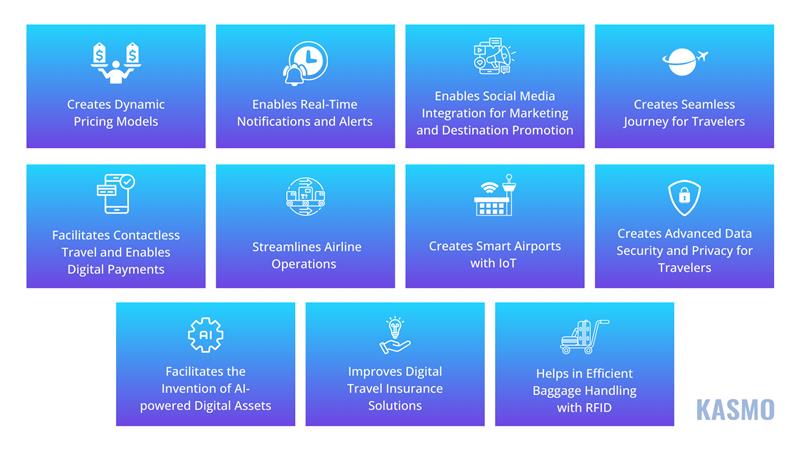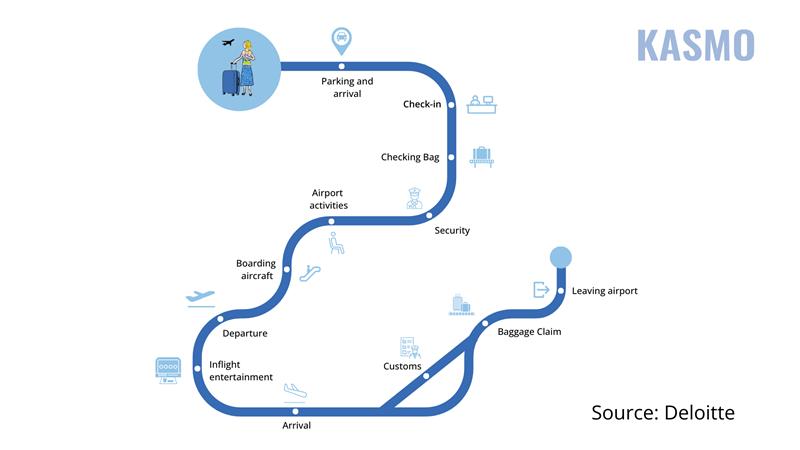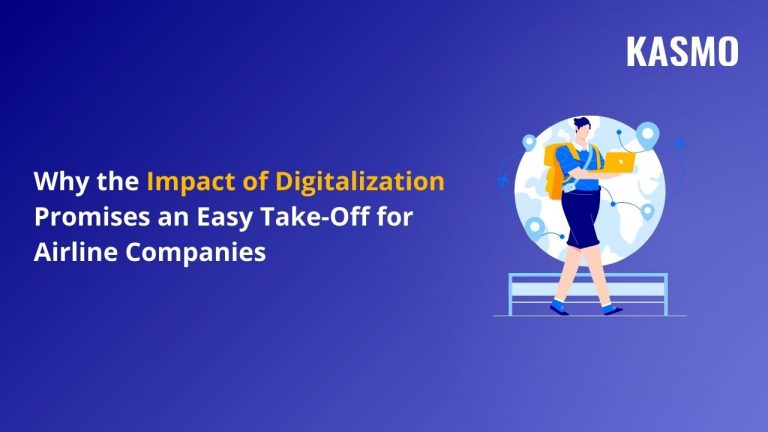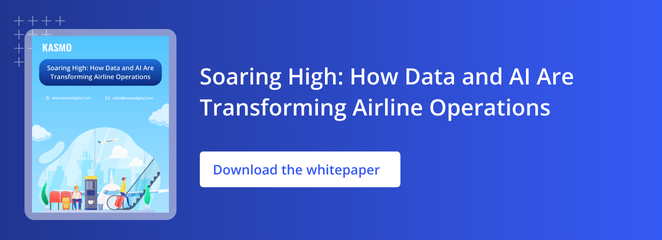Introduction
According to a survey by World Economic Forum – the impact of digitalization in the travel industry will be huge from 2016 – 2025. Digitalization in the travel industry is expected to:
“-Create up to $305 billions of value for the industry through increased profitability
–Migrate $100 billions of value from traditional players to new competitors
-Generate benefits valued at $700 billion for customers and wider society through a reduced environmental footprint, improved safety and security, and cost and time savings for consumers”. Through digitalization, the travel industry is trying to keep up with emerging customer demands and increasing traveler’s rush. The impact of digitalization on the airline industry is huge – creating vast opportunities to increase revenue and improve customer satisfaction.
Customers no longer want to wait in long queues or spend a lot of time planning their itineraries. New-gen travelers want to travel with airline companies who provide the best experience without any delay.
Impact of Digitalization in the Travel Industry
The impact of digitalization on the airline industry is creating huge differences into how customers used to travel before the pandemic and how they are travelling now. The popularity of Online Travel Agencies and booking platforms have been on the rise. These channels provide huge discounts and tailored services to customers, which attracts them to book airline tickets, hotels, etc., through these channels. According to Statista, the market size of the online travel industry is estimated to reach 838 billion U.S. dollars by 2029.
Here’s how digitalization impacts the airline industry:

Streamlines Airline Operations
Implementing AI in travel industry is not a mere trend anymore – every business leader is now planning to integrate AI with their operations, whether it be sales, marketing, finance or customer service. According to BCG, 95% of companies in the airline industry have planned to invest in digital support functions and operations.
Powered by AI, the new digital technologies have enabled airline companies to lower their carbon footprint and enabled airline companies to capture customer data from multiple touchpoints in their traveler’s journey. By consolidating data from different sources and integrating with AI to get actionable insights, airline companies have been able to transform their operations and elevate customer experience. However, leveraging data and AI have yet to increase customer loyalty in the travel industry.
So how do business leaders increase customer loyalty and improve brand reputation? Read this blog here to explore now!
Creates Seamless Journeys for Travelers
Digital platforms like Online Travel Agencies have created a huge impact on the airline industry. These digital platforms are providing unique services to customers, which has been the main reason for its growing popularity. Any online travel agency or booking platform can not only provide offers and discounts on airline tickets, but they also provide services like complementary upgrade to hotel rooms and provide ready-made and personalized itineraries tailored to individual customers.
Facilitates the Invention of AI-powered Digital Assets
The travel industry is benefitting a lot from Gen AI. AI-powered chatbots and AI Agents have enabled airline companies to streamline customer journeys. By customizing digital assistants and chatbots, airline companies can personalize trips for customers and create personalized itineraries for travelers. Gen AI can be integrated with airline operations which helps the companies take proactive measures and resolve any unexpected challenge in the traveler’s journey.
Enables Real-Time Notifications and Alerts
New-gen travelers need real-time updates while they are travelling. The impact of digitalization on the airline industry has led to the creation of automatic real-time notifications and alerts, which keeps travelers informed in real-time. With digitalization, airline companies can now send updates on flight delays, gate changes, baggage information, and even changing weather conditions. These real-time updates ensure that travelers are always in the loop and can make timely adjustments to their plans.
For instance, travelers receive a text message notifying them of a flight delay, while simultaneously getting an update about the estimated new departure time and possible alternate flights. This reduces stress and enhances the experience for travelers, particularly in case of any potential travel disruptions.
Facilitates Contactless Travel and Enables Digital Payments
The impact of digitalization on the airline industry has popularized contactless travel and digital payments. From booking flights to purchasing meals at airports, contactless payment systems have become an integral part for travelers. This shift enhances convenience for travelers.
Helps in Efficient Baggage Handling with RFID
According to Research and Markets, “the global market for Airport Baggage Handling Systems was valued at US$10.0 Billion in 2024 and is projected to reach US$14.3 Billion by 2030, growing at a CAGR of 6.2% from 2024 to 2030”. Technologies like RFID (Radio Frequency Identification) have enhanced baggage handling. AI-driven algorithms and IoT sensors help streamline baggage flow and predict maintenance needs, reducing operational downtime. The widespread adoption of RFID tags enables real-time tracking of luggage, minimizing mishandling and speeding up processing times.
The impact of digitalization on the airline industry has helped companies provide passengers with accurate, real-time updates on the status of their baggage, enhancing the travel experience. By embracing RFID and automation, airports are improving efficiency, security, and enhancing baggage handling operations.
Improves Digital Travel Insurance Solutions
Digitalization has made purchasing travel insurance quicker and more accessible. Travelers can now buy customized travel insurance plans online, often with the ability to instantly compare different policies and coverage options. Some digital platforms even offer real-time claim processing, helping travelers file claims and track their reimbursements directly through mobile apps or websites.
Creates Advanced Data Security and Privacy for Travelers
With the increase in online transactions and personal data sharing, travel companies have had to adopt advanced data security technologies to protect sensitive data. Digital platforms are now equipped with two-factor authentication and secure payment gateways for protecting customer data. With increasing cybercrimes, organizations and customers have started taking extreme precautions on how they share their data. By adhering to strict compliance regulatory policies, airline companies can prevent data privacy violations.
To help companies protect customer data, airline companies can use Snowflake data clean rooms and adhere to privacy policies and collaborate with partners to create better offers and recommendations for their customers.
Want to know more about data clean rooms and how they can help you leverage customer data without violating any data privacy laws? Download the whitepaper now!
Snowflake Data Clean Rooms: Secure, Scalable, and Strategic
Creates Smart Airports with IoT

Source: Deloitte
Smart airports, powered by the Internet of Things (IoT), are revolutionizing both the traveler experience and airport operations. IoT applications can be integrated throughout every stage of a traveler’s journey—from arrival at the curb to the gate—enhancing efficiency and passenger satisfaction.
For instance, IoT-powered systems assist passengers with navigation at the parking lot, check-in, and security processes, providing real-time updates and personalized assistance to travelers. On the operational side, IoT helps airports streamline traveler’s arrival and departure, improves baggage handling, flight scheduling, and resource allocation.
This smart ecosystem creates a seamless and more effortless airport experience for travelers. Integrating IoT in airports reduces the chances of travelers missing their flights, better customer service, and generates new revenue streams for airline companies, while enhancing operational efficiency. With the continued growth of IoT, airports are becoming increasingly smarter and more responsive to both passenger and operational needs.
Enables Social Media Integration for Marketing and Destination Promotion
New-gen travelers share everything on social media platforms. Now airline companies can understand customer behavior and gather feedback easily. Social media platforms also help companies promote tourist destinations and airport services to a broader audience. Travelers share their experiences in real-time, influencing potential customers’ travel choices. With this real-time feedback, travel companies can use customer-generated content, engage with social media influencers, and create targeted ads to reach out to a broader audience, increasing brand awareness and attracting new customers.
Creates Dynamic Pricing Models
The impact of digitalization has helped airline companies create dynamic pricing for their customers. When prices fluctuate based on demand, time of booking, seasonality, and customer behavior, airline companies can create dynamic pricing models for their customers. Airlines use advanced algorithms to adjust prices in real-time. This dynamic approach ensures that businesses can offer competitive prices to customers while maximizing their revenue.
Kasmo’s Contribution to Digitalization in the Airline Industry
Kasmo leverages Snowflake – the leading AI Data Cloud platform, to help businesses further enhance their data-driven decision-making process. Airline companies can leverage Kasmo’s Prebuilt BI Solution Accelerator – powered by Snowflake, to seamlessly unlock valuable insights from their data.
Here’s how airline companies can benefit from Kasmo’s Prebuilt BI Solution Accelerator:

Streamline Data Integration
Kasmo’s BI Solution Accelerator integrates data from multiple sources. This solution ingests the data from these sources into Snowflake using prebuilt ETL pipelines, ensuring smooth and reliable data flow. This centralized data repository enables airlines to easily access and analyze the data, empowering them with actionable insights.
Get Actionable Insights from Interactive Dashboards
The Prebuilt BI Solution Accelerator offers interactive dashboards that provide valuable insights into airline performance. Airlines can track revenue, analyze performance across different regions and flight routes, and gain a 360-degree view of travelers’ behavior, loyalty programs, and more.
Faster Decision-Making
By using Kasmo’s BI Solution Accelerator, airlines can significantly reduce the time required to gather and analyze data. The solution’s intuitive dashboards and prebuilt analytics models help airlines make faster, data-driven decisions, enhancing their ability to respond to market changes and improve customer satisfaction.
Why Travel Companies Need to Enhance Customer Experiences?
The impact of digitalization helped airline companies streamline their operations and elevate their services. However, the airline industry still needs to work on elevating their customer experiences (CX). Here’s why:
Rising Customer Expectations
Digitalization has set high expectations for the travel industry, with travelers looking for intuitive, easy-to-navigate websites, swift customer support, and personalized travel experiences. To meet these demands, travel companies must invest in technologies that can deliver high levels of services while maintaining the human touch.
Increasing Competition
With the rise of online travel agencies (OTAs) the competition within the travel industry is increasing. Customers can now choose from a wide range of airline companies offering cheaper prices and better in-flight services. For travel companies to stand out and maintain customer loyalty, they need to create memorable experiences for their customers, which will help them stand apart from competitors.
Increasing Need for Personalization
The impact of digitalization on the airline industry has created a drastic shift towards hyper-personalization. Companies that can provide tailored services are more likely to attract and retain loyal customers. By leveraging Snowflake – the popular AI Data Cloud platform, travel companies can offer tailored experiences such as personalized itineraries, travel recommendations, and special deals based on past behavior and preferences. Creating tailored services not only enhances the customer experience but also builds long-term loyalty.
How is Snowflake Transforming the Travel Industry?
Snowflake AI Data Cloud provides a unified platform that helps airline companies integrate and unify data from disparate sources and create a single source of truth. This empowers airline companies to get a 360-degree view of their operations and take data-driven decisions to elevate customer experiences. By breaking down data silos, Snowflake empowers the airline industry to harness the full potential of their data and AI.
Snowflake also enables airline companies to seamlessly share data with partners and collaborators. It also facilitates airline companies to utilize AI and simplify complex scheduling, such as flight or staff scheduling, minimizing delays and reducing costs.
Conclusion
The impact of digitalization in the airline industry is profound, transforming every aspect of the traveler’s experience as well as airport operations. From AI-driven operations to seamless digital journeys, real-time updates, and personalized services, digitalization is reshaping how travelers interact with airlines and other travel services. Additionally, digital platforms like OTAs, are creating more efficient, secure, and convenient travel experiences for consumers. By embracing digitalization, the travel industry can improve customer satisfaction, boost profitability, and foster long-term loyalty.



